Fleurs du Mal Magazine


Occupying the Stage: the Theater of May ’68 tells the story of student and worker uprisings in France through the lens of theater history, and the story of French theater through the lens of May ’68.
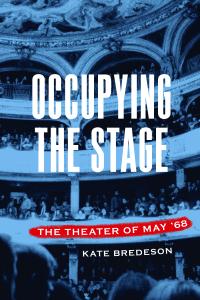 Based on detailed archival research and original translations, close readings of plays and historical documents, and a rigorous assessment of avant-garde theater history and theory, Occupying the Stage proposes that the French theater of 1959–71 forms a standalone paradigm called “The Theater of May ’68.”
Based on detailed archival research and original translations, close readings of plays and historical documents, and a rigorous assessment of avant-garde theater history and theory, Occupying the Stage proposes that the French theater of 1959–71 forms a standalone paradigm called “The Theater of May ’68.”
The book shows how French theater artists during this period used a strategy of occupation-occupying buildings, streets, language, words, traditions, and artistic processes-as their central tactic of protest and transformation. It further proposes that the Theater of May ’68 has left imprints on contemporary artists and activists, and that this theater offers a scaffolding on which to build a meaningful analysis of contemporary protest and performance in France, North America, and beyond.
At the book’s heart is an inquiry into how artists of the period used theater as a way to engage in political work and, concurrently, questioned and overhauled traditional theater practices so their art would better reflect the way they wanted the world to be. Occupying the Stage embraces the utopic vision of May ’68 while probing the period’s many contradictions. It thus affirms the vital role theater can play in the ongoing work of social change.
Occupying the Stage
The Theater of May ’68
Kate Bredeson (Author)
Publication Date: November 2018
Pages 232
Trim Size 6 x 9
Paper Text – $34.95
Northwestern University Press
Drama & Performance Studies
ISBN 978-0-8101-3815-5
# new books
Occupying the Stage
The Theater of May ’68
Kate Bredeson
• fleursdumal.nl magazine
More in: #Editors Choice Archiv, - Book News, - Book Stories, Archive A-B, Art & Literature News, AUDIO, CINEMA, RADIO & TV, Protests of MAY 1968, THEATRE
Grootvader Bernhard heeft een flesje in zijn hand en dept azijn op de arm van Thija, die door een bij is gestoken. Thija wordt vaak gestoken.
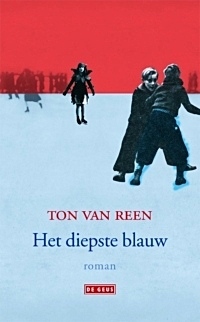 `Heb je de angel er uitgezogen?’ vraagt grootvader.
`Heb je de angel er uitgezogen?’ vraagt grootvader.
Thija laat het kleine zwarte puntje zien op de nagel van haar wijsvinger, maar door zijn kippige ogen ziet grootvader het niet.
`Rotbijen’, zegt Thija. `Waarom steken bijen vooral meisjes?’
`Meisjes hebben zoet bloed’, zegt grootvader. `Jullie zijn van suiker. Vroeger woonde er een meisje in ons dorp dat helemaal door de bijen is opgegeten. Van haar hebben ze alleen de botten teruggevonden.’
`Vorige week vertelde u dat ze door een wolf was opgegeten.’
`Zei ik dat? Dan moet ik me toen hebben vergist. Zie je, ik word oud. Ik haal de dingen door elkaar. Ik denk dat er twee meisjes zijn opgegeten, een door bijen en een door een wolf.’
`Dat van die wolf is waar’, zegt Mels. `Grootvader Rudolf vertelt het ook. In een strenge winter, langgeleden, zijn de wolven uit het bos gekomen en hebben een meisje opgegeten.’
`Ik denk dat Rudolf het verhaaltje over het meisje dat is opgegeten door de wolf zelf in omloop heeft gebracht.’
`Zoals u het praatje over het meisje dat is opgegeten door de bijen zelf hebt bedacht?’
`Zo zal het wel zijn gegaan’, lacht grootvader. `Oude mannen vertellen maar wat. Zo ontstaan verhalen. Sommigen schrijven ze op. En dat leren jullie dan op school als geschiedenis.’
Ton van Reen: Het diepste blauw (103)
wordt vervolgd
• fleursdumal.nl magazine
More in: - Book News, - Het diepste blauw, Archive Q-R, Reen, Ton van
Manos de primavera. Antología poética de Federico García Lorca
Hands of Spring : Anthology of Poetry by Federico García Lorca
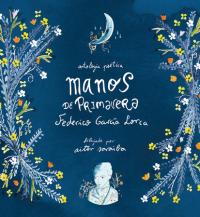 La voz de Lorca ilustrada por la mano poética de Aitor Saraiba.
La voz de Lorca ilustrada por la mano poética de Aitor Saraiba.
La luna, el agua, la tierra, las imágenes lorquianas caminan de la mano de las poéticas ilustraciones de Aitor Saraiba. Una defensa de las voces únicas y las imágenes indestructibles. Un libro, sí, un canto a la libertad y al arte.
Lorca’s voice, illustrated by the poetic hand of Aitor Saraiba.
The moon, water, earth: Lorca’s images go hand-in-hand with the poetic illustrations of Aitor Saraiba. A defense of unique voices and indestructible images. A book—and a song to freedom and art.
Manos de primavera. Antología poética de Federico García Lorca
Hands of Spring : Anthology of Poetry by Federico García Lorca
By Federico Garcia Lorca
Hardcover
Pages: 128
10 x 11
Aug 20, 2019
Published by Montena
PRH Grupo Editoria
Category: Poetry
Spanish Language Nonfiction
ISBN 9788417671419
ISBN-13: 9788417671419
$20.95
# More poetry
Anthology of Poetry
by Federico García Lorca
• fleursdumal.nl magazine
More in: - Book News, 4SEASONS#Spring, Archive K-L, Archive K-L, Art & Literature News, Garcia Lorca, Federico, WAR & PEACE
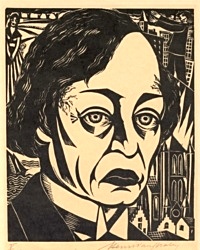
Vlaanderen, o welig huis
Vlaandren, o welig huis waar we zijn als genoden
aan rijke taaflen! – daar nu glooiend zijn de weiên
van zomer-granen, die hunne aêmende ebbe breien
naar malvend Ooste’ en statig dagerade-roden,
dewijl de morge’ ontwaakt ten hemel en ter Leië -:
wie kan u weten, en in ‘t harte niet verblijên;
niet danke’ om dagen, schoon als jonge zege-goden,
gelijk een beedlaar dankt om warme tarwe-broden?…
o Vlaandren, blijde van uw gevens-rede handen,
zwaar, daar ge delend gaat, in paarse en gele wade,
der krachten die uw schoot als rodend ooft beladen.
– Vlaandren, wie wéet u en de zomer-dageraden,
en voelt geen rilde liefde in zijne leden branden
‘lijk deze morgen door de veië Leië-landen?
Karel van de Woestijne
(1878 – 1929)
Vlaanderen, o welig huis
Portret van Karel van de Woestijne (1937) door Henri van Straten (1892 – 1944)
• fleursdumal.nl magazine
More in: Archive W-X, Archive W-X, Woestijne, Karel van de

Fluch
Du sträubst und wehrst!
Die Brände heulen
Flammen
Sengen!
Nicht Ich
Nicht Du
Nicht Dich!
Mich!
Mich!
August Stramm
(1874-1915)
Fluch, 1914
• fleursdumal.nl magazine
More in: *War Poetry Archive, Archive S-T, Expressionism, Stramm, August
De tentoonstelling ‘Art Brut | Jean Dubuffets revolutie in de kunst’ omvat ruim 150 werken waarmee kunstenaar en verzamelaar Jean Dubuffet in 1949 de bestaande culturele elite in Parijs choqueerde. De werken zijn zeventig jaar na dato voor het eerst te zien in Nederland.
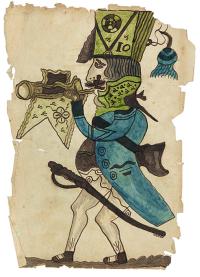 Direct na de Tweede Wereldoorlog begint Jean Dubuffet zijn zoektocht naar nieuwe, zuivere en spontane kunstwerken, ver weg van de gevestigde orde. Tijdens zijn reis bezoekt hij psychiatrische instellingen, gevangenissen en verzamelt hij kindertekeningen en volkskunst. Bij de verschillende ontmoetingen collectioneert hij werken die volgens hem hét bewijs zijn dat deze kunstvorm een plaats verdient in de kunstwereld. De gevestigde uitgangspunten, de academische blik en standaarden moesten omver worden geworpen ten gunste van een nieuwe, zuivere en spontane kunst.
Direct na de Tweede Wereldoorlog begint Jean Dubuffet zijn zoektocht naar nieuwe, zuivere en spontane kunstwerken, ver weg van de gevestigde orde. Tijdens zijn reis bezoekt hij psychiatrische instellingen, gevangenissen en verzamelt hij kindertekeningen en volkskunst. Bij de verschillende ontmoetingen collectioneert hij werken die volgens hem hét bewijs zijn dat deze kunstvorm een plaats verdient in de kunstwereld. De gevestigde uitgangspunten, de academische blik en standaarden moesten omver worden geworpen ten gunste van een nieuwe, zuivere en spontane kunst.
Deze tentoonstelling biedt een reconstructie van de uitgangspunten van Art Brut aan de hand van de door Dubuffet bijeen gebrachte werken. Waarom kocht hij bepaalde werken aan en andere juist niet? Welke selectiecriteria hanteerde hij bij het collectioneren van werken en welke informatie verzamelde hij over de kunstenaars? Wat is er terecht gekomen van de kunstenaars waarvan Jean Dubuffet werk collectioneerde voor zijn Compagnie l’Art Brut?
Te zien zijn o.a. werken van door Dubuffet ontdekte grootheden zoals Aloïse Corbaz, Fleury-Joseph Crépin, Gaston Duf, Auguste Forestier en de al gepubliceerde Adolf Wölfli.
Te zien t/m zondag 25 augustus 2019
Het Outsider Art Museum laat verrassende, niet gepolijste kunst zien van mensen met een bijzondere achtergrond. Je stapt in een compleet nieuwe wereld en wordt meegenomen in de wilde achtbaan van deze kunstenaars, die soms bijna maniakaal te werk gaan. Hun werk is authentiek, tegendraads en onconventioneel. Het leert je op een andere manier naar kunst kijken.
Het Outsider Art Museum
Hermitage Amsterdam
Amstel 51
1018 DR Amsterdam
# Meer informatie via website outsiderartmuseum
Afbeelding: Art Brut: Joseph Degaudé-Lambert | Zonder titel | 18e eeuw | Gouache op papier | 20 x 29.5 cm | Fotografie Atelier de numérisation, Ville de Lausanne – Outsider Art Museum Amsterdam
• fleursdumal.nl magazine
More in: Art & Literature News, Art Brut, FDM Art Gallery, Outsider Art
Het Russische absurdisme laat zich gemakkelijk terugbrengen tot één man: Daniil Charms. “Charms is kunst,’ schreef een vriend over hem.
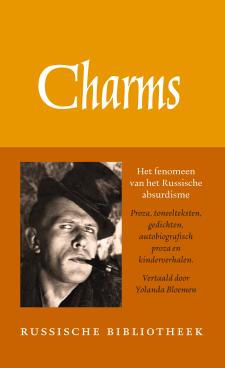 Met zijn opvallende verschijning, zijn excentriciteit, zijn creatieve tegendraadsheid was hij een fenomeen en groeide hij na zijn dood uit tot een wereldwijd bekende cultschrijver. “Mij interesseert alleen “onzin”,’ schreef hij ooit, “alleen dat wat geen enkele praktische zin heeft.’
Met zijn opvallende verschijning, zijn excentriciteit, zijn creatieve tegendraadsheid was hij een fenomeen en groeide hij na zijn dood uit tot een wereldwijd bekende cultschrijver. “Mij interesseert alleen “onzin”,’ schreef hij ooit, “alleen dat wat geen enkele praktische zin heeft.’
Charms blinkt uit in het tonen van de onsamenhangendheid van het bestaan en de onvoorspelbaarheid van het lot. Hij zoekt naar een ongefilterde verbeelding van de chaos die wij voortbrengen, los van zingeving en in de hoop op nieuwe ervaringen en aha-erlebnissen. In zijn werk laat hij willekeur vergezeld gaan van een stevige dosis, vaak zwartgallige, humor.
Voor het eerst verschijnt een grote uitgave van Charms’ werk in de Russische Bibliotheek, samengesteld uit proza, toneelteksten, gedichten, autobiografisch proza en kinderverhalen, en rijkelijk aangevuld met avantgardistische illustraties.
Auteur: Daniil Charms
Verzameld werk
Vertaald door Yolanda Bloemen
Russische Bibliotheek (RB)
Uitgeverij van Oorschot
Verschijningsdatum januari 2018
Taal Nederlands
1e druk
Bindwijze: Hardcover
Afmetingen 20,3 x 12,8 x 3,4 cm
736 pagina’s
ISBN 9789028282353
€ 44,99
• fleursdumal.nl magazine
More in: *Concrete + Visual Poetry A-E, - Book News, - Bookstores, Archive C-D, Archive C-D, Art & Literature News, Expressionism, Kharms (Charms), Daniil, Psychiatric hospitals
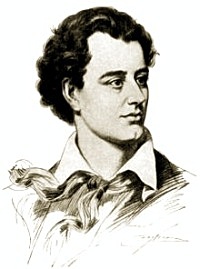
I Speak Not
I speak not, I trace not, I breathe not thy name;
There is grief in the sound, there is guilt in the fame;
But the tear that now burns on my cheek may impart
The deep thoughts that dwell in that silence of heart.
Too brief for our passion, too long for our peace,
Were those hours – can their joy or their bitterness cease?
We repent, we abjure, we will break from our chain, –
We will part, we will fly to – unite it again!
Oh! thine be the gladness, and mine be the guilt!
Forgive me, adored one! – forsake if thou wilt;
But the heart which is thine shall expire undebased,
And man shall not break it – whatever thou may’st.
And stern to the haughty, but humble to thee,
This soul in its bitterest blackness shall be;
And our days seem as swift, and our moments more sweet,
With thee at my side, than with worlds at our feet.
One sigh of thy sorrow, one look of thy love,
Shall turn me or fix, shall reward or reprove.
And the heartless may wonder at all I resign –
Thy lips shall reply, not to them, but to mine.
George Gordon Byron
(1788 – 1824)
I Speak Not
(Poem)
• fleursdumal.nl magazine
More in: Archive A-B, Archive A-B, Byron, Lord
10 décembre 1919: le prix Goncourt est attribué à Marcel Proust pour À l’ombre des jeunes filles en fleurs.
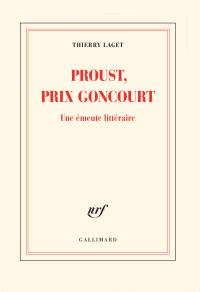 Aussitôt éclate un tonnerre de protestations : anciens combattants, pacifistes, réactionnaires, révolutionnaires, chacun se sent insulté par un livre qui, ressuscitant le temps perdu, semble dédaigner le temps présent.
Aussitôt éclate un tonnerre de protestations : anciens combattants, pacifistes, réactionnaires, révolutionnaires, chacun se sent insulté par un livre qui, ressuscitant le temps perdu, semble dédaigner le temps présent.
Pendant des semaines, Proust est vilipendé dans la presse, brocardé, injurié, menacé. Son tort? Ne plus être jeune, être riche, ne pas avoir fait la guerre, ne pas raconter la vie dans les tranchées.
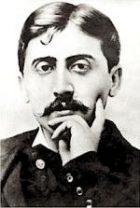 Retraçant l’histoire du prix et les manœuvres en vue de son attribution à Proust, s’appuyant sur des documents inédits, dont il dévoile nombre d’extraits savoureux, Thierry Laget fait le récit d’un événement inouï – cette partie de chamboule-tout qui a déplacé le pôle magnétique de la littérature – et de l’émeute dont il a donné le signal.
Retraçant l’histoire du prix et les manœuvres en vue de son attribution à Proust, s’appuyant sur des documents inédits, dont il dévoile nombre d’extraits savoureux, Thierry Laget fait le récit d’un événement inouï – cette partie de chamboule-tout qui a déplacé le pôle magnétique de la littérature – et de l’émeute dont il a donné le signal.
Thierry Laget
Proust, prix Goncourt. Une émeute littéraire
Collection Blanche, Gallimard
Parution : 04-04-2019
272 pages
140 x 205 mm
ISBN : 9782072846786
Genre : Essais
Prix €19,50
# new books
Thierry Laget
Proust
prix Goncourt
• fleursdumal.nl magazine
More in: - Book News, Archive K-L, Archive O-P, Archive O-P, Art & Literature News, Awards & Prizes, Marcel Proust, Proust, Marcel

This year, the Poetry International Festival Rotterdam turns 50!
The milestone makes it the oldest festival in the city, and one of the oldest in the country, with a wealth of history and highlights. Nobel Prize-winning poets once stood on Poetry’s stages as bright young talents, and the festival is both a shining example for, and founding parent of, poetry festivals worldwide.
Poetry International celebrates its golden anniversary with an extra festive edition at Concertgebouw De Doelen, which also hosted the debut festival back in 1970. Trailblazing poets will deliver transformative work thrumming with the now.
Unique fusions of poetry by engaging artists from the worlds of music, cinema, and dance amplify the power, the beauty, and the personal impact of poetry, here in the form of an intimate reading or workshop, there as a multidisciplinary theatrical poetry spectacle. Right in the heart of the city, inviting, challenging, unmissable.
What Happened to the Future? Since 1970, poetry luminaries from all over the world travel to Rotterdam for the annual Poetry International Festival. Thousands of poets have shared their work on the stages of De Doelen and the Schouwburg, but also in the city’s squares, parks, and trams. A landmark anniversary like this is an invitation to look back and celebrate the past, but at the same time, Poetry International will be looking ahead. Under the title What Happened to the Future?, the 50th Poetry International Festival unites its rich history with the world’s poems and poets of today and tomorrow.
The Metropole Orchestra – nominated for 18 Grammy Awards – will open the 50th Poetry International Festival with a literal bang. In this theatrical kick-off, the orchestra will perform unique duets with poets, including the legendary Last Poets, godfathers of hip hop and spoken word. Inspired by the festival’s theme, “What Happened to the Future?”, poets from the festival’s rich past, such as Judith Herzberg, Antjie Krog, Rita Dove, Raúl Zurita, and Tom Lanoye, will perform side by side with poets of a more recent vintage, such as Marieke Lucas Rijneveld, Koleka Putuma, Patricia Lockwood, Lieke Marsman, Frank Báez, Sayaka Osaki, Ulrike Almut Sandig, and Galina Rymboe. Whether rooted in the past or inspired by the future, their readings will festively raise the curtains on this golden-anniversary edition.
From festival hub De Doelen, Poetry International will take you on a poetic walking tour through the heart of Rotterdam. Led by a guide from UrbanGuides, you will discover extraordinary art in public spaces and have surprising encounters with festival poets and spoken-word artists. Explore the city’s hidden stories together!
Practical festival information
Following the Opening Night on 13 June the 50th Poetry International Festival will presents three days packed with readings, concerts, workshops, specials, poetic city walks, interviews, award ceremonies and book presentations. Check the changing starting times beforehand! Almost all programs take place or depart from De Doelen, in the heart of the city within a 5-minute walk of Rotterdam Central Station.
The 50th Poetry International Festival will kick-off on 13 June in the Main Auditorium of de Doelen. On 14, 15 and 16 June most events will take place in or around the Jurriaanse zaal. De Doelen is situated within walking distance of Rotterdam Central Station
# More information on website Poetry International Festival
• fleursdumal.nl magazine
More in: #Archive A-Z Sound Poetry, #More Poetry Archives, - Book News, Art & Literature News, AUDIO, CINEMA, RADIO & TV, LITERARY MAGAZINES, Marieke Lucas Rijneveld, MODERN POETRY, Poetry International, STREET POETRY, Tom Lanoye
Voor de bouwvakkers zit de werkdag erop. Ze lopen terug naar de auto en vertrekken. Mels rolt naar de silo om het resultaat beter te bekijken. De steigers staan al een paar meter boven de grond.
 De deur van de voormalige directiekamer staat open. Hij kan er zo binnenrijden. De meubels van de laatste directeuren staan er nog. Alles is gebleven zoals het was. Niemand heeft ooit de moeite genomen hier iets weg te halen. Alles is verrot en vervuild. Het heeft voor niemand waarde meer. Het ziet ernaaruit dat de arbeiders het allemaal in een container voor grof vuil zullen gooien.
De deur van de voormalige directiekamer staat open. Hij kan er zo binnenrijden. De meubels van de laatste directeuren staan er nog. Alles is gebleven zoals het was. Niemand heeft ooit de moeite genomen hier iets weg te halen. Alles is verrot en vervuild. Het heeft voor niemand waarde meer. Het ziet ernaaruit dat de arbeiders het allemaal in een container voor grof vuil zullen gooien.
Het gepolitoerde bureau van Frans-Joseph zit onder het vuil. De kast, met de monsters van de meelproducten die ze maakten, staat er nog. De affiches aan de muur, huisvrouwen die glunderend hun pakken meel vasthouden. De foto’s van de stichters van de fabriek, de weduwe Hubben-Houba zo breed als de molenaar zelf, aan haar rokken zoon Frits, die later de molen zou overnemen, en Tom, de zoon die naar Amerika zou verdwijnen. En de dochters die naar het klooster werden gestuurd, zodat ze geen beroep konden doen op de erfenis, en zo geruisloos uit de geschiedenis van de familie en van de fabriek werden weggesluisd.
De grote foto van Frits Hubben, de erfgenaam die het bedrijf liet verhuizen van de watermolen naar de fabriek, zittend aan een bureau. Naast hem de twee zonen, Frans-Hubert en Frans-Joseph, beiden al met een blik in de ogen die verraadt dat het hen allemaal geen bal interesseert.
De foto’s van de laatste generatie. De kinderen van Frans-Hubert en van Frans-Joseph, van wie niemand nog in het bedrijf heeft gewerkt, vrolijk lachend bijeen op een grasveld voor een villa.
Hij vindt het jammer dat hij niet eerder wist dat dit hier allemaal hing te vergaan. Hij had het graag willen behouden. De foto’s had hij kunnen bewaren in zijn archief, maar nu zijn ze waardeloos. Vocht heeft ze aangetast en beschimmeld. Waterkringen lopen door het rottende papier. Deze rotzooi kan hij niet meer mee naar huis nemen, ook al zou hij het willen. Lizet wil het zeker niet in huis hebben.
In een laatje vindt hij stukken van het reclamearchief, waar Frits Hubben zo zorgvuldig mee omging. Foto’s van vrouwen die verlekkerd een beslag kloppen, met in hun hand een pak patentmeel van Hubben. Foto’s van de verpakkingen van Luxe- en Excellentmeel, die zo mooi zijn dat ze van meel een kostbaarheid maken. Een foto van een dikke man, glunderend met een pak anti-obstipatiemeel vol zemelen in de hand, het wondermeel waarvan hardlijvige mensen een gezonde stoelgang zouden krijgen. Foto’s in een bakkerij waar de balen Hubben Broodmeel hoog liggen opgeslagen, en de bakker en zijn knechten trots de glimmende broden met suikerkorst tonen. Winkels in levensmiddelen en koloniale waren met Hubbens bijzondere soorten brood- en bakmeel in de rekken. Hubbens broodmeel in Indonesië en Zuid-Afrika. Alle foto’s stralen glorie uit en demonstreren daardoor des te meer hoe onnodig de ondergang van de fabriek was.
In zijn woede grijpt hij een pot met een verdroogde bloem van de vensterbank en gooit hem naar het familieportret van de lapzwansen. Het glas rinkelt. Dat doet goed.
Dan pas ziet hij de bouwlift, aan de achterkant van de silo. Die moeten ze vandaag hebben geplaatst. In een opwelling rijdt hij ernaartoe en rolt het platform op van de lift. Hij drukt op de knop. Het ding werkt. Ze hebben vergeten de stroom uit te schakelen.
Langzaam gaat hij naar boven. Het is opwindend. Hij voelt zich een klein kind dat iets doet wat verboden is.
De lift staat stil. Hij is op het hoogste punt aangekomen. Nu weer naar beneden? Of het dak op? De vloerplaat kan uitgeschoven worden. Door een druk op een knop schuift de plaat tot op het dak en vormt een brug.
Hij rijdt het dak op. Hij kijkt rond en voelt zich vrij.
Op nog geen halve meter van de rand stopt hij de rolstoel. Tussen zijn voeten doorkijkend, in de diepte, ziet hij het dorp zoals een vogel het ziet. De rookpluimen boven de rode, blauwe en grauwe daken. Hij kan ze tellen. Nu hij er bovenop kijkt, ontdekt hij de regelmaat in het patroon. Broederlijk liggen de huizen dicht naast elkaar. Hun goten omarmen elkaar en verbinden meer dan honderd huizen. Aan elkaar gesloten pannenrijen, rood, blauw en grijs, versterken het beeld van een gesloten dorp.
Vanaf hier is zijn huis het zevende dak van rechts. Als je het dorp vanaf het noorden binnenkomt, is zijn huis het derde aan de rechterkant. Kom je vanuit het zuiden, dan is het ‘t tweeëntwintigste huis aan de linkerkant. Kom je van de weg langs de Wijer, dan is het vanaf de brug het zevende huis rechts, aan de overkant van de straat.
Zou je met een bootje over de Wijer het dorp binnenvaren tegen de stroom op, dan is het het negende huis links. Tegenover zijn huis ligt slagerij Kemp. Kemp levert bierworst aan café De Zwaan, dat aan de andere kant van de brug ligt, en fijne vleeswaren als er in De Zwaan een uitvaartmaal wordt geserveerd of als er een trouwpartij is.
Maar er komt niemand over de Wijer het dorp binnenvaren. Nu, laat in de middag, is de beek een zilveren streep tussen de weilanden, die soms heel even zwart wordt als er een wolk voor de zon trekt. Vanmiddag zijn er weinig wolken. De zon schijnt zo overdadig dat de miljoenen margrieten langs het riviertje een breed wit tapijt vormen. De oevers zijn net zo wit als vroeger, toen de weide wit was omdat zijn moeder er de lakens op te bleken had gelegd en hij haar moest helpen om stenen op de hoeken te leggen, zodat de wind ze niet kon meenemen.
Van bovenaf lijkt het dorp veel lieflijker dan het in werkelijkheid is. Het centrum van vroeger is maar klein. De huizen staan er dicht op elkaar, alsof ze bang zijn voor de uitgestrektheid van de velden, weilanden en bossen die het dorp omringen, maar vooral voor de groeiende buitenwijken.
Hoewel het dorp diep beneden hem ligt, lijkt alles waar hij naar kijkt toch heel dichtbij. De wand van de silo versterkt de geluiden van beneden, zodat hij alles hoort wat zich daar afspeelt. Er zijn maar een paar mensen op straat, maar doordat hij van zo hoog op hen neerkijkt, hebben ze hun proporties verloren: het zijn gedrongen poppetjes.
Nu hoeft hij alleen maar de rem van zijn rolstoel te ontkoppelen, de wind zal hem wel een zetje willen geven. Voor het eerst sinds lang zullen ze naar hem kijken, allemaal, daar in het dorp. Hij glimlacht bij de gedachte, juist omdat hij dat niet nodig heeft. Hij hoeft geen aandacht, hij wil alleen maar dat ze weten wie hij is.
Hij hoort hoe de mensen met elkaar praten. De daken kunnen wel het zicht op de mensen verbergen, maar nemen niet hun stemmen weg. Hij meent zelfs het ademen van de baby in de tuin van zijn dochter te horen. En het snorren van de poes, die als een bal opgerold aan het voeteneind in de kinderwagen ligt. Het is gevaarlijk. De kat mag niet op de baby gaan liggen, dat zou de dood van het kind kunnen betekenen.
Eigenlijk zou hij moeten schreeuwen, om de kat te verjagen. Maar het beest zal hem niet horen. Van beneden kan niemand hem horen. Hij heeft eens een man vanaf het dak van de silo naar beneden zien schreeuwen, de mond wijdopen, de handen als een toeter aan de mond, maar niemand hoorde hem.
Het is zelfs nog maar de vraag of ze hem van de straat af kunnen zien. Als ze naar boven zouden kijken, kijken ze tegen de onderkant van de rolstoel aan, de voetenplankjes. Ze zullen denken dat het ding iets is van de aannemer die de silo verbouwt.
Opeens hoort hij zoemen achter zijn rug. De lift. De vloerplaat wordt naar binnen gehaald. Dan zakt de lift naar beneden. Heeft iemand hem ontdekt? Halen ze hem nu van het dak?
Hij hoort veel stemmen tegelijk en doet moeite om het koor van geluiden te ontrafelen. Een voor een weet hij de stemmen in zijn oren te ontcijferen. De stem van Kemp, de slager, de stemmen van de samenwonende nichtjes Tinie en Tinie van de Bercken, die beiden al bijna honderd moeten zijn en theedrinken op het terras achter het huis waarmee ze samen in de tijd wegzakken. De postbode, die `post!’ roept bij elke brievenbus waar hij wat in gooit, ook bij een huis dat al jaren leegstaat en waarin de post zich in de gang tot een berg heeft opgehoopt.
Hij hoort niet alleen de stemmen van degenen die beneden zijn, er klinken ook fragmenten door van stemmen van langgeleden. De bewoners van het kerkhof. Grootvader Bernhard. Juffrouw Fijnhout. Ze zijn rumoerig en praten door elkaar heen, net of ze hem allemaal tegelijk iets willen zeggen. Of ze hem roepen. Eén stem is goed te verstaan omdat hij zacht en rustig is. Grootvader Bernhard. Fragmenten van zinnen. `Zonnebloemen zijn … zomerbui … lusten jullie een … heb ik al klaar’, waaruit Mels begrijpt dat regen goed was voor zonnebloemen en dat grootvader glazen limonade voor hen op het aanrecht heeft staan. Hoewel grootvader Bernhard steeds stukken van zinnen inslikt, begrijpt hij hem toch goed als hij zegt: `Niet doen … is heilig … niet de hand aan …’ Even ziet hij hem zitten, in zijn leunstoel, boven op de betonnen grafsteen, maar dan lost zijn beeld op in het zonlicht om weer op te duiken bij het molenhuis, op zijn stukje land bij de Wijer.
Ton van Reen: Het diepste blauw (102)
wordt vervolgd
• fleursdumal.nl magazine
More in: - Book News, - Het diepste blauw, Archive Q-R, Reen, Ton van
Metershoge spinnen, kolossale ogen en hangende spiralen in de monumentale vleugelnootboom.
Dit voorjaar presenteert het Rijksmuseum Louise Bourgeois in de Rijksmuseumtuinen. Het is voor het eerst dat een ruime selectie van Bourgeois’ buitenbeelden bijeen wordt gebracht.
Met twaalf beelden toont het Rijksmuseum een overzicht van een halve eeuw werk, van The Blind Leading the Blind (1947-49) tot Crouching Spider (2003). Veel van deze werken zijn nooit eerder in Nederland te zien geweest.
Louise Bourgeois (1911-2010) geniet internationale faam als een van de belangrijkste vrouwelijke kunstenaars van de twintigste eeuw en werd wereldberoemd met haar monumentale beelden van spinnen.
Louise Bourgeois in de Rijksmuseumtuinen
Tentoonstelling 24 mei – 3 november 2019
Van de hand van de samensteller van de tentoonstelling, Alfred Pacquement, verschijnt een catalogus: Louise Bourgeois in de Rijksmuseumtuinen in het Nederlands en Engels. Vanaf begin juni verkrijgbaar via rijksmuseumshop.nl. Prijs: €15,-
# meer informatie op website rijksmuseum
• fleursdumal.nl magazine
More in: - Book News, Archive A-B, Art & Literature News, Exhibition Archive, Louise Bourgeois, Sculpture
Thank you for reading Fleurs du Mal - magazine for art & literature